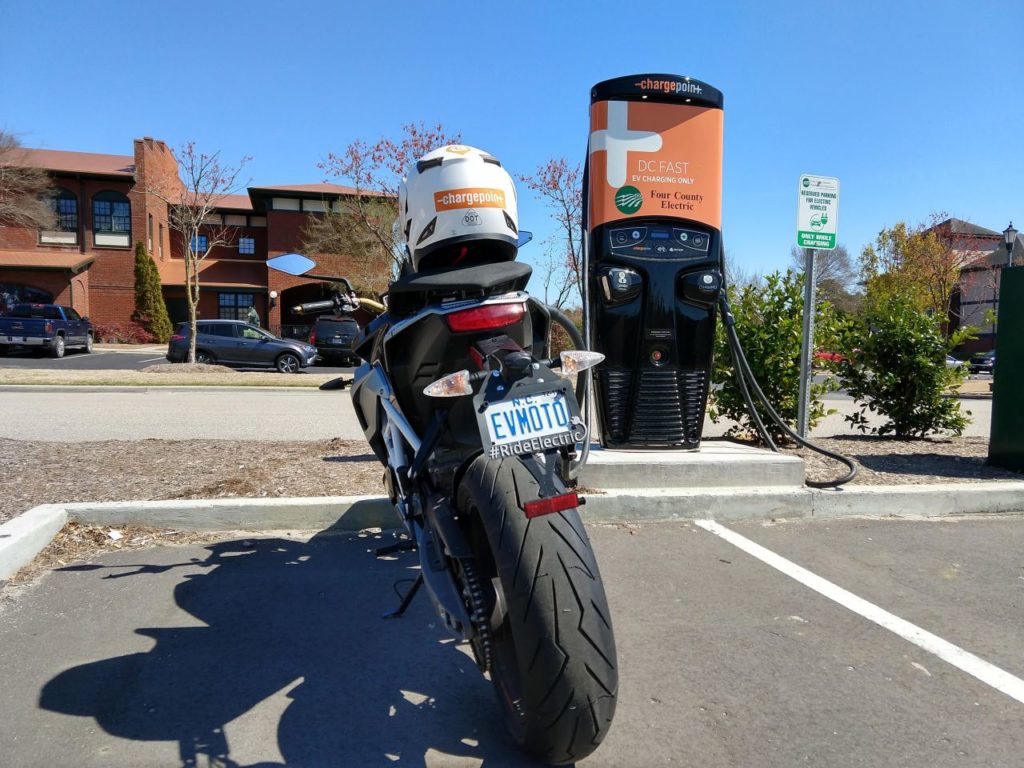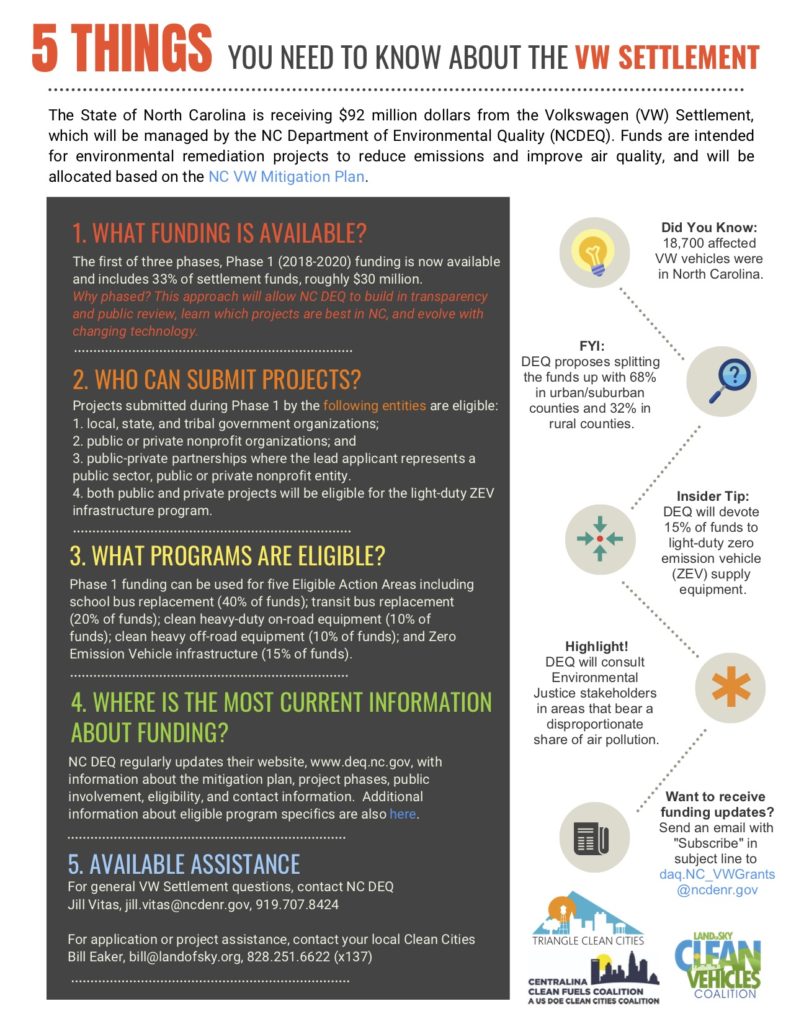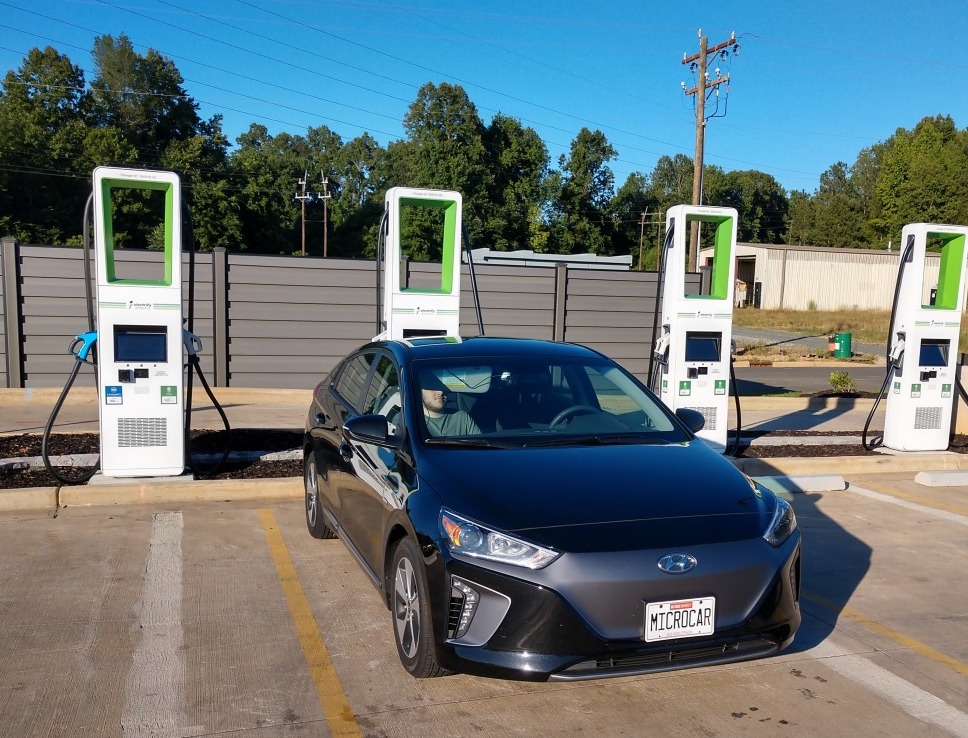How to Fund Electric Vehicle Charging Stations in North Carolina

Are you interested in installing new Electric Vehicle Supply Equipment (EVSE) (electric vehicle charging stations) in your North Carolina community? There are three possible sources of funding to make it happen.
EVSE; an element in an infrastructure that supplies electric energy for recharging of plug-in electric vehicles including electric cars, neighborhood electric vehicles and plug-in hybrids; is deployed throughout the country in key areas for public charging as a supplement to residential charging, according to the US Department of Energy Alternative Fuels Data Center.
There are three types of electric vehicle chargers – Level 1, Level 2 and DC Fast Charging. Types are classified by the rate at which the batteries are charged. Level 1 provides 2-5 miles of range per 1 hour of charging, Level 2 provides 10-20 miles of range per 1 hour of charging, and DC Fast Charging provides 60-80 miles of range per 20 minutes of charging. Learn more about each type of equipment and developing infrastructure to charge plug-in electric vehicles at the US Department of Energy Alternative Fuels Data Center website here. You can also view the current map of EV chargers in the United States and Canada here.
There are three potential sources of funds to support installation of EVSE in North Carolina:
- The VW Settlement gives North Carolina $92 million dollars for projects to reduce vehicular air pollution. These funds will be administered by NC DEQ as a part of their beneficiary mitigation plan. Fifteen percent of these funds will be allotted for EVSE (both Level 2 and DC Fast Chargers).

The NCDEQ just released a Request For Proposals (RFP) for VW settlement funds for DC Fast chargers this week. Under the DC Fast Charge program:
- $3.4 million will be available for the installation of Zero Emission Vehicle (ZEV) Charging Infrastructure
- Projects in designated corridors will receive priority to expand the state’s charging infrastructure network
- Projects can be submitted by eligible businesses, incorporated nonprofits, and state, local, tribal or municipal government agencies
Applications will be available on July 1, 2019, and the submission deadline is September 30, 2019. The Zero Emission Vehicle (ZEV) Level 2 Charging program RFP will be released at a later date. Read more about the NCDEQ RFPs here.
2. The NC Clean Energy Technology Center’s Clean Transportation team also has limited grant funding for EVSE. The next Clean Fuels Advanced Technology (CFAT) project RFP will be released in the fall or winter of 2019. Funding will be restricted to projects where there is no ground disturbance involved (such as in a parking deck or where wires and conduit are already in place) – and no digging, trenching, pavement cutting, repaving, etc. is allowed. Take a look at the last round of funding for insights on what the next round may look like, and join the newsletter list to know when the next RFP will be issued by going here. For more information on CFAT funding, contact John Bonitz at jhbonitz@ncsu.edu.

3. Duke Energy plans to invest $76 million to help spur EV adoption across the state, according to Duke Energy. Duke Energy’s proposal to the NC Utilities Commission would help fund the adoption of electric school buses and electric public transportation, and lead to almost 2,500 new charging stations in the state – more than doubling the amount of public stations currently in North Carolina, according to Duke Energy. The initiative is to help meet Gov. Roy Cooper’s executive order goals of having 80,000 electric vehicles registered in the state and to reduce the state’s carbon footprint by 40 percent below 2005 levels within the next six years. Duke Energy’s plan includes:
Residential EV Charging: This program will provide a $1,000 rebate for qualifying Level II charging stations for up to 800 residential customers. Level II charging allows customers to charge their EVs up to six times faster than a standard wall outlet.
Public Charging: Duke Energy will install and operate more than 800 public charging stations across North Carolina, including DC Fast Charging, Public Level II and multifamily locations, which will expand the state’s network of EV charging stations.
Fleet EV Charging: The program will provide a $2,500 rebate for 900 qualifying charging stations for commercial and industrial customers who operate fleets that are transitioning to electric and plug-in hybrid vehicles. Municipalities and universities also qualify for these rebates.
EV School Bus Charging Station: Duke Energy will provide financial support to eligible customers to procure up to 85 electric school buses. Duke Energy will install the associated charging infrastructure.
EV Transit Bus Charging Station: Duke Energy will install and operate more than 100 electric transit bus charging stations for eligible transit agencies electing to procure electric buses. Electric transit buses eliminate diesel emissions and reduce fuel and maintenance costs for transit agencies.”
Source: Duke Energy
For any questions on Duke Energy’s EVSE initiatives, contact Lisa Poger at Lisa.Poger@duke-energy.com.